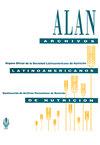巴西成年人饮食行为与健康积极自我感知的关系
IF 0.3
4区 医学
Q4 NUTRITION & DIETETICS
引用次数: 0
摘要
健康的饮食习惯与较低的慢性病患病率有关。目的:验证年轻人、中年人和老年人的饮食行为与自我感知健康(SPH)之间的关系。材料和方法:这是一项针对52166名18岁及以上巴西成年人的横断面研究。因变量为正SPH,而自变量为饮食行为(用午餐换零食;用晚餐换零食;摄入豆类、前一天的超加工食品、水果、蔬菜和加工果汁/软饮料)。数据分析中使用了对方差进行稳健调整的泊松回归。结果:不同性别的进食行为与SPH的关系相似。然而,就年龄组而言,在年轻人中观察到了更明显的关系。在所调查的行为中,水果和蔬菜的消费与SPH的关系最为明显。此外,积极饮食行为的数量越高,在所有性别和年龄组中,积极SPH的患病率就越高。结论:这项研究的结果强化了健康饮食行为对健康的重要性,并表明这些行为与年轻人的积极SPH以及经常食用水果和蔬菜的习惯之间存在更直接的关系。本文章由计算机程序翻译,如有差异,请以英文原文为准。
Association between eating behaviors and positive self-perception of health in Brazilian Adults
Healthy eating habits are related to a lower prevalence of chronic diseases. Objective: Verify the relationship between eating behaviors and self-perceived health (SPH) in young, middle-aged, and older adults. Materials and methods: This is a cross-sectional study with 52166 Brazilian adults aged 18 years and over. The dependent variable was positive SPH, whereas the independent variable was the eating behavior (exchanging lunch for snacks; exchanging dinner for snacks; intake of beans, ultra-processed food the previous day, fruits, vegetables, and processed juices/soft drinks). Poisson regression with robust adjustment for variance was used in the data analysis. Results: The relationship between eating behaviors and SPH was similar between genders. However, a more evident relationship was observed among young adults, regarding the age group. The consumption of fruits and vegetables was most clearly associated with SPH among the investigated behaviors. Furthermore, the higher the number of positive eating behaviors, the higher the prevalence of positive SPH in both genders and all age groups. Conclusion: The findings of this study reinforce the importance of healthy eating behaviors for health and indicate a more direct relationship between these and positive SPH in young adults and as a habit of regularly consuming fruits and vegetables.
求助全文
通过发布文献求助,成功后即可免费获取论文全文。
去求助
来源期刊
CiteScore
0.50
自引率
0.00%
发文量
31
期刊介绍:
Archivos Latinoamericanos de Nutrición (ALAN) is the official publication of the Sociedad Latinoamericana de Nutición (SLAN), for the dissemination of knowledge in the fields of food and nutrition, principally throughout the American Hemisphere. Articles in Spanish, English, Portuguese and French are accepted, both from the Society members and from nonmembers, in the following categories: 1. General articles (critical scientific reviews); 2. Research articles (originals); 3. Papers in applied nutrition (analytical results from intervention programs and discussion of reconmendations of practical application), and 4. Letters to Editor (short comments of general interest or about scientific facts and results previously published in Archives).

 求助内容:
求助内容: 应助结果提醒方式:
应助结果提醒方式:


